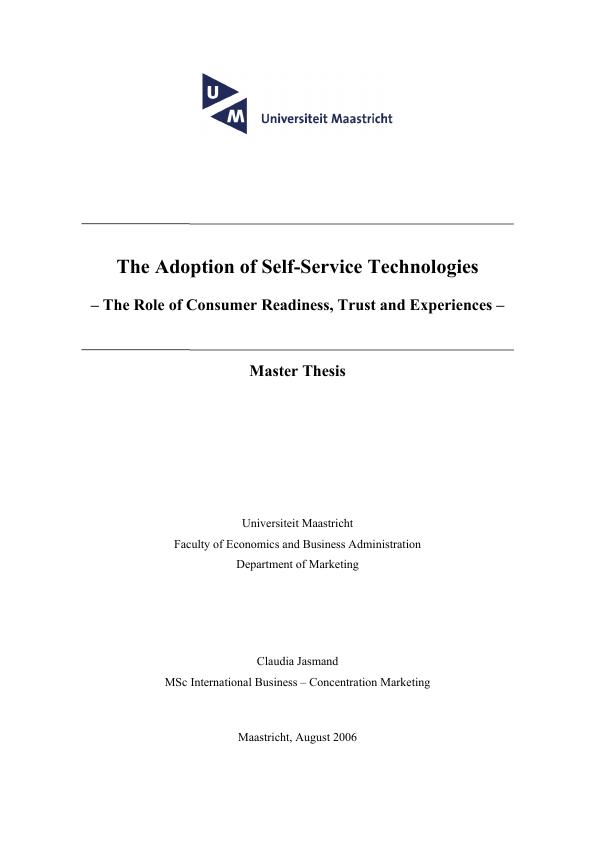The combination of today’s ever increasing competition in the marketplace and rapid technology development change the way how services are designed, produced, and experienced. One of the outcomes of this changing nature of services is the proliferation of self-service technologies, which reflect a new way how companies seek to efficiently serve their customers. However, not all self-service technologies are successfully adopted, and not all consumers engage in the technology-based self-service economy. So, what drives consumers to provide services by themselves without service employee involvement? This master thesis aims at gaining further insight into the factors being critical to the consumers’ adoption of self-service technologies. In particular, this research focuses on the role of consumer readiness consisting of role clarity, motivation, and ability, and the moderating effects of consumers’ trust and experiences related to the service provider and the self-service technology on the consumers’ voluntary decision to use airlines’ self-check-in op-tions. In addition, a potential self-service technology interface dependence of the adoption factors’ influence is examined by means of a scenario-based approach. The corresponding empirical study makes use of a web-based survey facing the 239 respondents with the choice between the counter check-in and either a kiosk or Internet check-in option. The results confirm the critical role of motivation and role clarity, but question the raison-d’être of the dimension ability. The findings also provide evidence for trust and experiences having moderating effects on the relationship between consumer readiness and self-service technology use. A potential self-service technology interface dependence of the factors is suggested by the results; however, the alternative explanation that the sample’s Internet-experience is responsible for the identified dependence can not be ruled out. This master thesis contributes to a deeper understanding of critical factors influencing the adoption of self-service technologies, and underlines the importance of integrating all three aspects relevant to SST adoption – the consumer, self-service technology, and service provider.
Table of Contents
- INTRODUCTION
- The Proliferation of Self-Service Technologies
- Problem Statement and Research Questions
- Master Thesis Outlined
- Contribution
- LITERATURE REVIEW – SELF-SERVICE TECHNOLOGY ADOPTION
- Factors Influencing the Adoption of SSTs
- Self-Service Technologies as Innovations
- Self-Service Technology Related Factors
- Consumer Related Factors
- Service Provider Related Factors
- Emerging Research Questions
- DEVELOPMENT OF HYPOTHESES
- Consumer Readiness
- Role Clarity
- Motivation
- Ability
- Moderating Effects
- Trust in Technology and in the Service Provider
- Previous Experiences with Service Employees
- Previous Experiences with Technology-Based Products and Services
- Self-Service Technology-Interface Dependence
- RESEARCH DESIGN
- Research Setting
- Sample Design
- Methodology
- Survey Approach
- Questionnaire Development
- Construct Measures
- Data Collection
- ANALYSIS AND RESULTS
- Sample Description
- Data Preparation
- Scenario A
- Internet Check-in Users versus Non-Users
- Scenario A Consumer Readiness Hypotheses
- Scenario A Moderating Effects Hypotheses
- Scenario B
- Kiosk Check-In Users versus Non-Users
- Scenario B-Consumer Readiness Hypotheses
- Scenario B - Moderating Effects
- Comparison of Scenarios
- DISCUSSION AND IMPLICATIONS
- Check-in Choice Behavior
- The Role of Consumer Readiness
- The Influence of Trust and Experiences
- Managerial Implications
- Theoretical Implications and Future Research
- Limitations
Objectives and Key Themes
This master thesis aims to gain further insight into the factors driving consumer adoption of self-service technologies (SSTs). The research focuses on the role of consumer readiness, including role clarity, motivation, and ability, as well as the moderating effects of trust and experiences on the decision to use airline self-check-in options. The thesis also investigates the potential dependence of these factors on the SST interface.
- The adoption of self-service technologies by consumers
- The role of consumer readiness in SST adoption
- The impact of trust and experiences on SST use
- The potential dependence of adoption factors on the SST interface
- The application of these findings to the airline industry, specifically self-check-in options
Chapter Summaries
- Introduction: This chapter sets the context for the research, discussing the increasing prevalence of SSTs and outlining the problem statement and research questions. The chapter also highlights the contribution of the thesis.
- Literature Review: This chapter reviews existing literature on SST adoption, identifying key factors influencing adoption and highlighting emerging research questions. It examines factors related to the SST itself, consumer characteristics, and the service provider.
- Development of Hypotheses: This chapter develops hypotheses based on the literature review. It focuses on the three components of consumer readiness: role clarity, motivation, and ability. The chapter also explores the moderating effects of trust in technology and service providers, as well as past experiences with service employees and technology-based products and services. Lastly, it addresses the potential dependence of adoption factors on the SST interface.
- Research Design: This chapter details the research design, including the research setting, sample design, methodology, and data collection methods. It describes the survey approach, questionnaire development, construct measures, and the use of a scenario-based approach.
- Analysis and Results: This chapter presents the results of the empirical study, including sample characteristics, data preparation, and analysis of the two scenarios (Internet check-in and kiosk check-in). It analyzes the consumer readiness hypotheses, moderating effects, and potential interface dependence.
Keywords
This research focuses on the adoption of self-service technologies, particularly in the airline industry. It examines the role of consumer readiness, trust, experiences, and the influence of the SST interface. The key terms and concepts include: self-service technology adoption, consumer readiness, trust, experiences, SST interface dependence, airline industry, self-check-in options.
- Quote paper
- Claudia Jasmand (Author), 2006, The Adoption of Self-Service Technologies, Munich, GRIN Verlag, https://www.grin.com/document/75028




